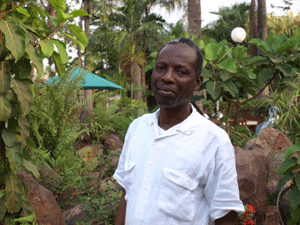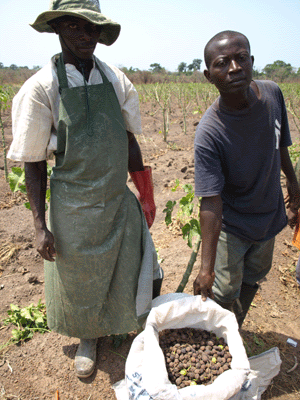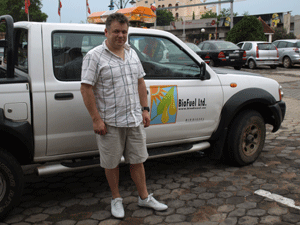Jatropha in Ghana: right or wrong?
on
Jatropha in Ghana: right or wrong?
In many African countries, agricultural land is a hot commodity. Now foreign players are getting involved, touching down in countries such as Zambia, Sudan and Ethiopia to grow crops for biofuel. In Ghana, where increasing amounts of jatropha are grown to produce biofuel for the European market, the foreign investors’ lack of familiarity with local customs and systems of land rights have stoked tensions with the indigenous population. Some western producers have fallen into the trap of making deals with irresponsible chiefs. Others try to do things right, but are taken advantage of by corrupt authorities or NGOs.
 |
| David Eli, Director of Foodspan, is persona non grata to the biofuel operators |
Based in Stavanger and controlled by Norwegian supplier to the oil and gas industry IKM, Scanfuel has succeeded in securing a massive 400,000 hectares of agricultural land, but how it managed to do so is not entirely clear. Right now it’s the leader of the pack in Ghana, aiming at an oil production of 5000 barrels per day. Together with the shadowy company Kimminick that is owned by Ghanians in Canada, Scanfuel is by far the largest of the fifteen or so mainly foreign investors from the United States, Israel, Italy, Brazil and elsewhere who (are planning to) grow jatropha or sugar cane on Ghanaian soil and are regularly the subject of controversy.
Investors in agricultural land in Ghana are increasingly coming under fire. They’re accused of exploitation and of driving local farmers out and are viewed by some as a risk to food security. The upheaval about their ever-increasing presence lies at the root of Wiersma’s defensive attitude: Scanfield is not amused that I’m touring the area together with director David Eli of Foodspan, a non-governmental organisation for food security. But Eli is no anti-capitalist hawk and his concerns are legitimate. ‘The areas in which the majority of these companies operate are situated in our food basket, where 45 to 50 percent of all Ghana’s food crops are grown,’ he says.
As far as the biofuel operators are concerned, Eli is most definitely persona non grata. In a popular national radio programme he is said to have claimed that jatropha planters have driven tens of thousands of local farmers from their lands. ‘Those statements caused us a lot of trouble,’ a European biofuel entrepreneur tells me. As it turns out, however, the accusations of the NGO director are off the mark. An MP3 recording of the broadcast in question shows that the claim that so angers the investors wasn’t made by him.
Harvest time
This morning Wiersma has already negotiated his Volvo four-wheel drive over innumerable bumps and potholes to inspect his jatropha plantation some 50 kilometres away. After he has returned to Agogo I take a look for myself. According to Scanfuel’s original plans, the plantation will eventually cover some 240,000 hectares. The rest of the area controlled by Scanfuel has been earmarked for food production.
It’s harvest time and some of the plants have already been cut and stripped of the fruits that will be pressed to yield their oil. Elsewhere women from the nearby village are still picking in the fields. The plantation has brought jobs. At the side of the road a group of men displays a bag of fruit that is waiting to be picked up and transported to a factory complex with its new silos a bit further up. This represents the centre of the plantation, managed by Wiersma in exemplary fashion.
Up until 2009 Erik Wiersma held the post of Global Manager for Sustainable Oil Supply at British firm D1 Oils. Already active in Southern Africa, D1 Oils wanted to extend its operations to Ghana. The London Stock Exchange-listed company specialises in jatropha but suffered a setback when UK oil giant BP exited the joint venture they operated together. Wiersma subsequently switched to Scanfuel, which is said to have set aside $ 20 to 30 million to start up operations in Ghana. Wiersma is currently CEO of Scanfuel Ghana and divides his time between Agogo and his home in Belgium.
 |
| Workers harvesting jatropha |
Mister Erik
But ten kilometres or so further down the road there’s considerably less enthusiasm for Mister Erik, as the CEO is known by his farm staff. The little village of Efirese has been practically swallowed up by a sea of jatropha that terminates just before its outskirts, as if held back by an invisible hand. The village’s 500 inhabitants have been squeezed by the Scanfuel expansion. With the Afram River at their backs and a wave of jatropha just beyond the front door they have no room to move. Efirese’s chief is Amadou Zackari. He says he’s appealed in vain to Scanfuel to reserve some agricultural land for the village. ‘This is all very difficult for us. Without land the village cannot grow,’ says Zackari. The village chief says Scanfuel’s presence offers no benefits, only drawbacks.
Unlike other villages in the area, the inhabitants of Efirese refuse to work on the plantation because they consider the wages too low. And the women of the village are furious. The land they worked was suddenly ploughed up for jatropha from one day to the next without any prior warning. They have lost the livelihood they had from the nuts of the dawadana trees which yielded oil for them to sell and to use in cooking. ‘[Scanfuel] has chopped down all these trees,’ an angry Akroporka Fafra (45) exclaims in a video interview recorded in December 2009. ‘Now we have no work. Collecting and processing these nuts was our source of livelihood.’ The video shows the other women and children from the tiny village gathered round Akroporka, applauding her words.
In the district capital of Kolongo the Honourable Thomas Osei-Bonsu is equally dismayed by Scanfuel’s actions. Osei-Bonsu is the area’s Chief Executive, its key administrative player. Typically someone whom any right-thinking investor would like to keep on side. But Scanfuel has clearly succeeded in antagonising him. The Chief Executive’s father lost his hearth and home because of Scanfuel, whispers someone in the waiting room of Kolongo’s city hall. ‘I’m very concerned,’ confesses the courteous, impeccably dressed Osei-Bonsu in his roomy office. ‘We expected a lot from our foreign investors. The people working the land thought that they would receive compensation or that they would be able to continue working as outgrowers (contract farmers). But that hasn’t happened. Machines came onto the land and the people were forced to pack their things and leave. Farmers are now preparing a legal case to demand compensation. That’s very bad for the company’s image. If Scanfuel had negotiated with the locals, that wouldn’t have happened. But the company hasn’t responded to my request to enter into negotiations.’
Archaic
In a recent World Bank report on biofuel development in Ghana the researchers George Schooneveld, Laura Germana and Eric Nutakorb write that ‘Effective governance of the sector is essential for enabling Ghana to benefit from large-scale foreign investment in land-intensive activities.’ But that’s exactly what’s lacking in Ghana and elsewhere in Africa. ‘Some of the most significant obstacles to sustainable development from agricultural foreign direct investment in Ghana are the limited oversight of government agencies and limited downward accountability (and foresight) of chiefs,’ the researchers conclude. And that’s why Scanfuel and other foreign companies are liable to lose their way.
One of the causes of the problem is the archaic way in which land ownership is regulated. Ghana has a system of ‘family land’ and ‘customary land’. Investors tend to avoid family land, because it is often unclear who the owner is. As in many other African countries, customary land is in the hands of paramount chiefs. Such chiefs can effectively dispose of the land as they wish. Scanfuel acquired the rights of over 400,000 hectares of community land for an undisclosed sum from Agogo’s paramount chief, who has considerable political influence. Rather than building up contacts and goodwill with the communities involved and local authorities, Scanfuel looks above all to be hiding behind this chief.
 |
| Steinar Kolnes, one of BioFuel Africa’s owners |
Mistrust
In a report published last year, the United Nations confirmed the initially hidden rise of large-scale land acquisition in Africa. Subsequently the UN’s Food and Agricultural Organisation (FAO) made a start on drawing up rules for foreign investment in agricultural land. To invest successfully in agriculture in Africa, investors should learn to skirt the sensitivities surrounding the subject of land. A successful investor is one who allays the ever-present mistrust of foreign operators by proving that modernisation with the aid of foreign capital can result in a win-win situation. ‘That’s why entrepreneurs need to their homework, taking time to become thoroughly acquainted with the system and trying to get all those involved on board,’ advises Ghanaian business consultant Dr Joyce Bruce.
But even then things can go wrong. Bruce advised another Norwegian company, BioFuel Africa, that was seeking to set up operations in northern Ghana. The BioFuel Africa executives heeded all Bruce’s advice, conducting extensive talks with all those concerned in a bid to win broad-based support. But despite the company’s best efforts, its venture bogged down in a mire of contradictory legislation and sabotage.
Steinar Kolnes, one of BioFuel Africa’s owners, takes up the story when I interview him in Accra. Allegations that BioFuel Africa had procured its environmental permits by corrupt means started circulating in Ghana in 2008, he says. The accusations started not long after BioFuel Africa had rejected the ‘services’ of an NGO worker who had offered to set himself up as a mediator between the company and a local chief in negotiations over land rights. In January 2009 BioFuel Africa signed a contract to supply Norway’s state oil company Statoil. A day later Statoil received a warning that BioFuel Africa was facing charges of corruption in Ghana.
‘The source of the allegations was never traced, but the end result was that Statoil and other investors pulled out,’ Steinar Kolnes says. His company has been forced to adapt to the situation: it’s pulled out of a region in North Ghana and secured a lease contract for 154,000 hectares elsewhere. This year it expects to produce between 300 and 400 tonnes of raw jatropha oil. But Kolnes says BioFuel Africa has put the brakes on its original plans for large-scale expansion in jatropha and is now also producing rice and other food crops on the side. ‘Because of all the commotion over food security and to avoid any trouble with NGOs.’
|
EU biofuel targets The 2009 Renewable Energy Directive sets an overall EU target of 20% renewable energy in total energy consumption by 2020, translated into binding national targets for Member States. Every Member States has to reach individual national targets for the overall share of renewable energy. In addition, in the transport sector, all Member States have to reach the same target of a 10% share of renewable energy, which includes biofuels. Only biofuels that meet the EU's sustainability requirements can count towards the targets in the Directive. The Communication on voluntary schemes and default values in the EU biofuels and bioliquids sustainability scheme can be found on the website. The Communication on the practical implementation of the EU biofuels and bioliquids sustainability scheme and on counting rules for biofuels can be found here. The Decision on guidelines for the calculation of land carbon stocks can be found here. World Bank report Tuesday 7 September the World Bank issued an extensive report on large land acquisitions, including acquisitions for growing biofuel feedstocks in developing countries. This report can be found here. |


Discussion (0 comments)